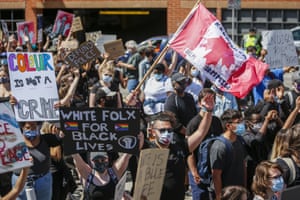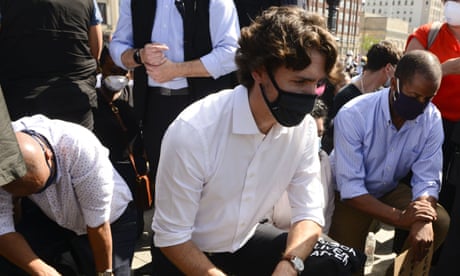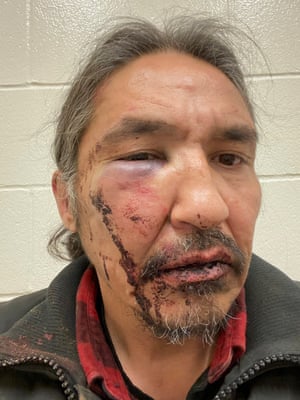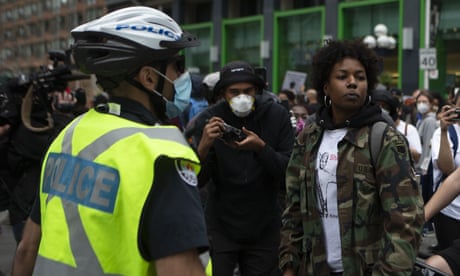Amid the anger over brutality and injustice, a number of prominent Canadians have cast doubt on the idea that racism is entrenched
Leyland Cecco in Toronto
Sun 14 Jun 2020

Protesters in Calgary rally against police violence and racism. Activists and historians argue that before change can come, Canadians must first accept a tarnished history. Photograph: Jeff McIntosh/AP
After a string of violent incidents involving police officers, activists and ordinary people across Canada have joined the global chorus calling for a reckoning with racism, policing, inequality and the long reach of history.
In recent weeks, a Black woman fell to her death after police were called to her flat in Toronto; an Indigenous woman suffering a mental health crisis was shot dead by an officer in New Brunswick and footage emerged showing Royal Canadian Mounted Police officers in Alberta forcing a First Nations chief to the ground and punching him in the head. On Friday evening, an Indigenous man was shot dead by the RCMP in New Brunswick.

Justin Trudeau takes a knee but is silent on reforms to policing
But amid the growing anger, a number of prominent Canadians – premiers, columnists and the head of the RCMP – have cast doubt on the idea that racism is entrenched in the country’s institutions.
“Thank God we’re different than the United States and we don’t have the systemic, deep roots they’ve had for years,” said Ontario premier Doug Ford, a view echoed by neighbouring Quebec premier François Legault.
RCMP commissioner Brenda Lucki told the Globe and Mail on Wednesday: “I think that if systemic racism is meaning that racism is entrenched in our policies and procedures, I would say that we don’t have systemic racism.” On Friday, Lucki clarified her position in a statement. “I did acknowledge that we, like others, have racism in our organization, but I did not say definitively that systemic racism exists in the RCMP. I should have.” Hours later, Rodney Levi of the Metepenagiag Mi’kmaq Nation was shot dead by RCMP officers.
Activists and historians argue that before change can come, Canadians must first accept a tarnished history and the persistent structural inequities that it has bequeathed the nation.
The numbers are clear: Black and Indigenous peoples in Canada are disproportionately over-represented in prisons and jails across the country. As students, they face harsher discipline in schools and are suspended at a higher rate than white students. In Toronto, the country’s largest city, Black residents are 20 times more likely to be shot by police.
On Thursday, Justin Trudeau contradicted the RCMP chief’s comments, saying it was clear systemic racism was present in the country’s federal police force.
“As much as we admire and support the RCMP, we know we need to do better. It is not just the individual examples we have seen, it’s the issues faced by Canadians of diverse backgrounds over years, decades and generations,” the prime minister said.
On Friday, Lucki clarified her position, saying: “I did acknowledge that we, like others, have racism in our organization, but I did not say definitively that systemic racism exists in the RCMP. I should have.”
Some argue that Canada’s national police force is itself emblematic of racism.
“The RCMP was not created to protect Indigenous people. It was created to protect white settlers from Indigenous folks – while suppressing our ceremonies and implementing laws that sought to decimate us,” said Brooks Arcand-Paul, a Cree lawyer and executive on the Indigenous Bar Association.
“Even today, the police will always look at Indigenous people and Black folks in our territories as potentially requiring some kind of suppression.”
Protesters have highlighted the case of Chantel Moore, 26, who was fatally shot last month by officers during a mental health “wellness check” and Regis Korchinski-Paquet, who fell to her death after police responded to a mental health emergency. But Arcand-Paul said her death was only the latest in a litany of cases where Indigenous lives are lost and families denied justice. He points to the case of Gerald Stanley, a white farmer who shot Colten Boushie, an indigenous man, in the head – but was acquitted by an all-white jury.
“When we talk about systemic racism, we’re not just trying to lay the blame on the RCMP. It’s the entire structure that is causing continued violence against Black and Indigenous bodies in this country,” said Arcand-Paul.
Some police forces, including in Canada’s largest city, have acknowledged systemic racism exists and pledged to make change. Last week, Toronto police chief Mark Saunders knelt with protesters.
But such actions have also raised skepticism among activists.
“Police in Canada are trying to escape this moment of criticism by casting themselves compassionate forces that care about these issues. However, once you actually dig into the data, it shows this is not necessarily the case,” said Bashir Mohamed, a researcher and amateur historian whose work has highlighted the often-forgotten racist history of western Canada.
“I think it’s by design that police forces want this information hidden, because then it makes them less responsible for actually acknowledging this is a problem.”

Allan Adam, who was injured by police forcing him to the ground in March. Photograph: Allan Adam/Reuters
Mohamed points to the practice of “carding” – Canada’s version of stop-and-frisk – in which police conduct street checks of residents with little or no cause. While agencies have defended the practice in the past, the limited available data shows the policy disproportionately impacts racialized communities.
https://www.theguardian.com/commentisfree/2019/nov/06/canada-overdue-reckoning-anti-black-racism
Canada is overdue for a reckoning with its anti-black racism
Tayo Bero
Ford, the Ontario premier, quickly walked back his remarks, suggesting his comments had been taken out of context. “Of course there’s systemic racism in Ontario, there’s systemic racism across this country,” Ford said the next day.
Quebec premier François Legault also suggested there was “no system in place that discriminate” in the province – and said the province had not experienced slavery.
But political leaders’ resistance to the idea that systemic racism exists within state institutions often comes from a poor understanding of the country’s past, says educator and historian Natasha Henry, president of the Ontario Black History Society.
“It’s part of the Canadian national narrative of positioning ourselves in juxtaposition to the United States. That’s how we get this ‘exceptional Canada’ of being welcoming and warm – and not paying attention to our own parallel history of racial exclusion and the dispossession.”
In addition to being factually inaccurate, this popular view speaks to a “refusal to take responsibility” for two centuries of slavery within the country’s history, says Henry.
For generations, Canadian history has concentrated on the country’s position as the last stop on the Underground Railroad – a place which meant freedom for those who escaped slavery in the US. But the same narrative omits the experiences of thousands of enslaved people within Canada, says Henry.
According to Henry’s research, the earliest record of African enslavement in colonial Canada was the sale of a young boy, named Olivier LeJeune in 1629.
Slavery was formally ended in the British empire in 1834, including British North America, but legislation was repeatedly passed that would weaken anti-slavery laws in the years leading up to abolition.
After emancipation, Black people in Canada still faced segregation, and the looming threat of hate groups like the Ku Klux Klan.
“You have to decide – are you going to accept all of Canada or none of Canada?” said Henry. “Because you can’t parcel out you want. That’s not how history works.”
Indigenous peoples were also enslaved by colonial powers – a reality often forgotten in the country’s school textbooks. And by the end of the 1700s, as many as 2,000 Black people were enslaved in the Maritimes region. About 300 more people were enslaved in the area known as Lower Canada (what is now the province of Quebec) and as many as 700 in Upper Canada (Ontario).
Others argue that Canada needs a more comprehensive history.
“It’s important to incorporate anti-black racism into curricula, but also black history. Not just civil rights heroes, but also black artists,” said Mohamed. “This shows that my people existed in Canada. It shows that we have a long history of slavery over 200 years, but also have a long history of black arts and black culture.”

Canada police under scrutiny after two women die after encounters with officers
https://www.theguardian.com/world/2020/jun/05/canada-police-under-scrutiny-after-two-women-die-after-encounters-with-officers
Tayo Bero
Ford, the Ontario premier, quickly walked back his remarks, suggesting his comments had been taken out of context. “Of course there’s systemic racism in Ontario, there’s systemic racism across this country,” Ford said the next day.
Quebec premier François Legault also suggested there was “no system in place that discriminate” in the province – and said the province had not experienced slavery.
But political leaders’ resistance to the idea that systemic racism exists within state institutions often comes from a poor understanding of the country’s past, says educator and historian Natasha Henry, president of the Ontario Black History Society.
“It’s part of the Canadian national narrative of positioning ourselves in juxtaposition to the United States. That’s how we get this ‘exceptional Canada’ of being welcoming and warm – and not paying attention to our own parallel history of racial exclusion and the dispossession.”
In addition to being factually inaccurate, this popular view speaks to a “refusal to take responsibility” for two centuries of slavery within the country’s history, says Henry.
For generations, Canadian history has concentrated on the country’s position as the last stop on the Underground Railroad – a place which meant freedom for those who escaped slavery in the US. But the same narrative omits the experiences of thousands of enslaved people within Canada, says Henry.
According to Henry’s research, the earliest record of African enslavement in colonial Canada was the sale of a young boy, named Olivier LeJeune in 1629.
Slavery was formally ended in the British empire in 1834, including British North America, but legislation was repeatedly passed that would weaken anti-slavery laws in the years leading up to abolition.
After emancipation, Black people in Canada still faced segregation, and the looming threat of hate groups like the Ku Klux Klan.
“You have to decide – are you going to accept all of Canada or none of Canada?” said Henry. “Because you can’t parcel out you want. That’s not how history works.”
Indigenous peoples were also enslaved by colonial powers – a reality often forgotten in the country’s school textbooks. And by the end of the 1700s, as many as 2,000 Black people were enslaved in the Maritimes region. About 300 more people were enslaved in the area known as Lower Canada (what is now the province of Quebec) and as many as 700 in Upper Canada (Ontario).
Others argue that Canada needs a more comprehensive history.
“It’s important to incorporate anti-black racism into curricula, but also black history. Not just civil rights heroes, but also black artists,” said Mohamed. “This shows that my people existed in Canada. It shows that we have a long history of slavery over 200 years, but also have a long history of black arts and black culture.”

Canada police under scrutiny after two women die after encounters with officers
https://www.theguardian.com/world/2020/jun/05/canada-police-under-scrutiny-after-two-women-die-after-encounters-with-officers
Only in recent years has Canada grappled with the legacy of its residential schools – where many Indigenous students were sent against their will and experienced verbal, physical and sexual abuse – a period which schools have now started to teach.
“At the end of the day, there’s going to be some difficult conversations. Because it’s important to acknowledge that our experiences aren’t just a fabricated story. They are lived realities,” said Arcand-Paul, who has been pulled over and questioned on multiple occasions by police.
“And we’re not going to be able to achieve true understanding until, at last, we’re able to share our stories – frankly and candidly – to a receptive audience.”
“At the end of the day, there’s going to be some difficult conversations. Because it’s important to acknowledge that our experiences aren’t just a fabricated story. They are lived realities,” said Arcand-Paul, who has been pulled over and questioned on multiple occasions by police.
“And we’re not going to be able to achieve true understanding until, at last, we’re able to share our stories – frankly and candidly – to a receptive audience.”
No comments:
Post a Comment